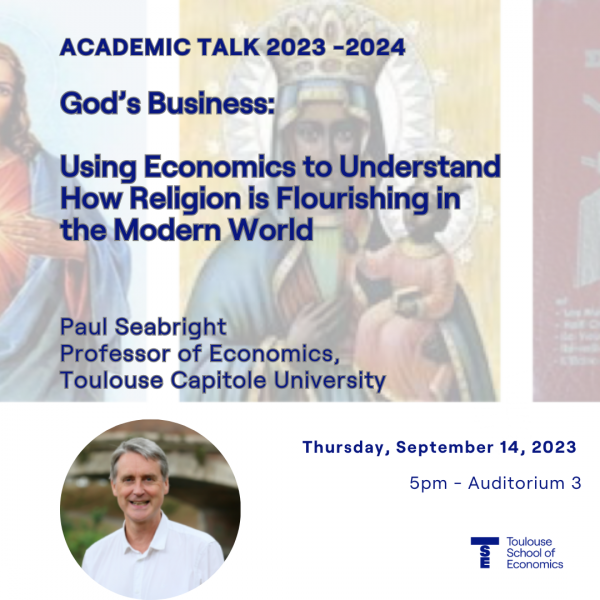Le service carrières est heureux d'accueillir le 14 septembre 2023 Paul Seabright professeur à TSE et à l'Institut d'études avancées de Toulouse (IAST) qui viendra exposer aux étudiants de TSE une lecture en anglais “God’s Business: Using Economics to Understand How Religion is Flourishing in the Modern World".
Cette initiative a pour objectif de développer la culture économique des étudiants et de les aider dans la constrcution de leur projet professionnel.
ACADEMIC TALK JEUDI 14 septembre 2023- 17h00- Auditorium 3
Contact : careers@tse-fr.eu

Résumé (en anglais):
Discussion in recent years about a perceived decline in the importance of religion in North America and parts of Western Europe masks a deeper truth. At the world level, the importance of religion in people's lives describes varying trajectories across countries, rising in some and falling in others, with no clear trend visible on average. There seem to be many countries where religiosity is fairly low and stable, and many where it is fairly high and stable. Apparent declines or increases in religiosity in various countries may reflect, not secular long-term trends but movements from a high stable state to a low stable state or vice versa.
Two main factors seem to influence the importance accorded to religion in different countries. The first is the extent to which religious movements can offer their members community benefits, both spiritual and material, that secular institutions in their country do not. Evangelical and Pentecostal churches, but also innovative Muslim, Hindu and Buddhist organizations have been able to grow in strength in recent years in this way, particularly in Africa, Asia and Latin America. The second is the extent to which religion is perceived as relatively politically neutral. When it comes instead to be perceived as politically partisan, it gradually loses legitimacy with those members of the population who are not natural supporters of the political regime.
Religion may gain legitimacy, as it did under Communism in many countries, by standing up for individuals of all political persuasions who are threatened by authoritarian regimes ; the growth of Orthodox Christianity in the last three decades, as well as Catholicism in Poland, are striking examples. However, religion may lose legitimacy (as it appears to have done in countries as diverse as Ireland, Iran, Spain under Franco and Chile under Pinochet, and may now be doing in the United States) where it is perceived as having been instrumentalized by partisan political interests. In Book 5 of The Wealth of Nations, Adam Smith described a theory of the political economy of religion which has interesting relevance to the 21st century world.
Drawing on a forthcoming book from Princeton University Press, I set out how Smith's theory (which he began working on during a visit to Toulouse) can be allied to the modern theory of platform competition (also due to researchers based in Toulouse) to provide remarkable insights into the future of religion in the 21st century.



